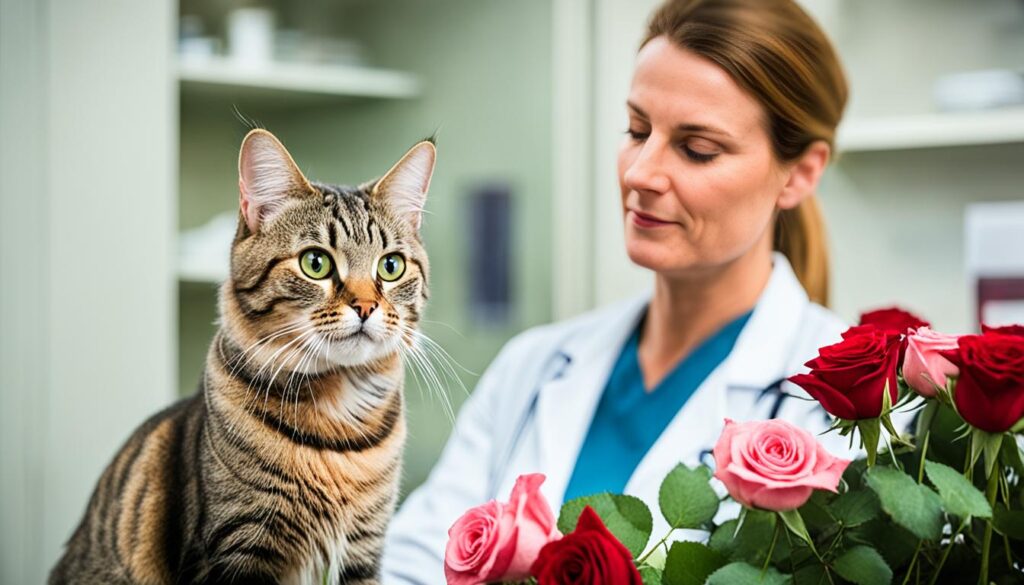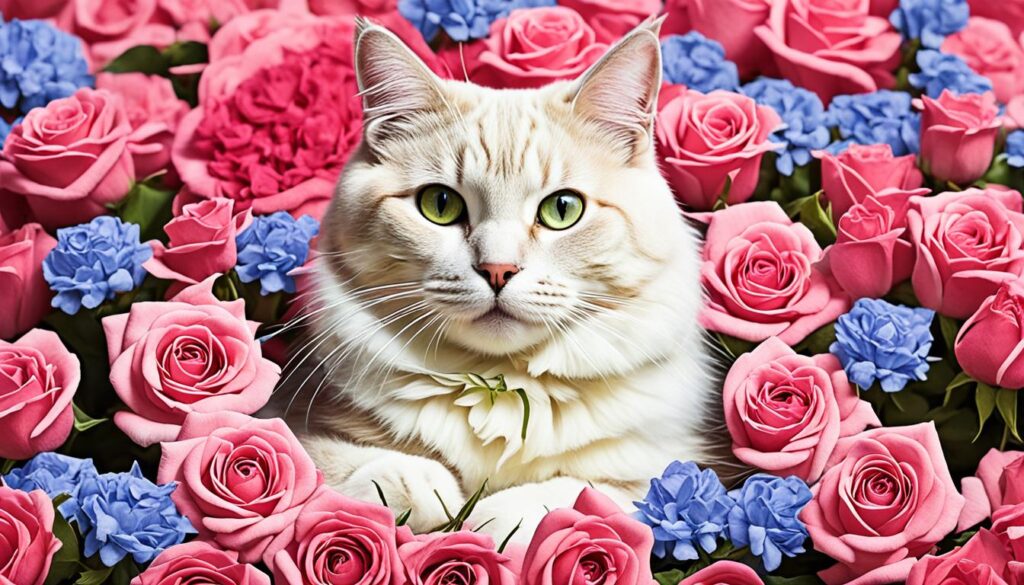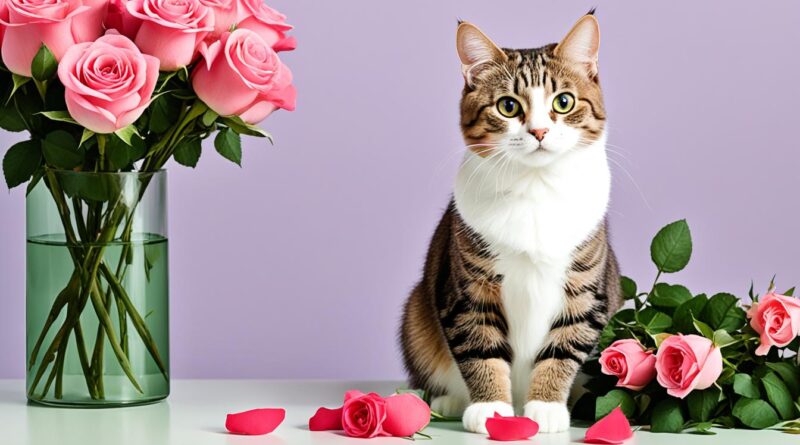Are Roses Poisonous to Cats? Exploring the Safety of Roses for Feline Friends
Roses have long been cherished for their beauty and fragrance, but many cat owners wonder if these beloved flowers pose a danger to their feline friends. In this article, we’ll delve into the topic of rose toxicity in cats and explore the potential dangers of roses for our furry companions. Let’s separate fact from fiction and learn how to keep our cats safe around these delightful blooms.
Key Takeaways:
- Roses themselves are not toxic to cats.
- Rose petals, leaves, and stems are non-toxic to cats, but thorns can cause injury.
- Pesticides sprayed on roses can be poisonous to cats if ingested.
- If your cat shows signs of illness after encountering roses, seek veterinary care promptly.
- There are other cat-friendly flowers that can be considered as alternatives to roses.
The Safety of Roses for Cats: Insights from a Veterinary Spokesperson
When it comes to the safety of roses for cats, it’s important to differentiate between the plant itself and potential hazards associated with it. According to Dr. Maureen K. Murithi, a veterinary spokesperson, roses themselves are not toxic to cats. However, certain parts of the rose plant can cause mild stomach upset if consumed in large quantities.
If cats ingest the leaves, stem, or petals of roses, they may experience symptoms such as vomiting and diarrhea. While these are generally mild reactions, it’s still essential to monitor your cat closely and ensure they have access to fresh water to stay hydrated.
“Roses, by themselves, are not poisonous to cats. However, ingestion of the leaves or petals can result in gastrointestinal upset, including vomiting and diarrhea. If these symptoms persist or worsen, it is advisable to consult a veterinarian for further evaluation and treatment.” – Dr. Maureen K. Murithi

Rose poisoning in cats can also occur if cats consume pesticides sprayed on roses. These chemicals can be highly toxic and cause a wide range of symptoms, including drooling, tremors, fever, vomiting, lethargy, lack of appetite, diarrhea, difficulty breathing, and even seizures. In such cases, immediate veterinary care is crucial to ensure the health and well-being of your feline friend.
It’s important to be proactive in preventing rose poisoning in cats. Avoid using pesticides on your rose plants, especially those that contain toxic chemicals harmful to cats. Opt for safer and natural alternatives to keep both your roses and your cat safe.
Preventing Rose Poisoning in Cats
Here are some precautions you can take to keep your cat safe around roses:
- Avoid using pesticides on rose plants. Opt for natural pest control methods.
- Regularly check rose bushes for any injuries caused by thorns. Treat small wounds with antibiotic ointment to prevent infection.
- Keep cats away from rose plants by using physical barriers or fencing.
- Provide alternative plants for cats to satisfy their munching behavior, such as cat-safe flowers or cat grass.
- Train your cat to leave roses alone using positive reinforcement techniques.
By following these precautions, you can enjoy having roses in your garden without compromising the safety and well-being of your beloved feline companion.
Roses and Feline Health: What You Need to Know
While roses themselves are not toxic to cats, it’s essential to ensure a cat-safe environment, especially when it comes to potential hazards. By being aware of the risks associated with rose consumption and taking precautions, you can help protect your cat’s health and well-being.
| Roses and Cats | Toxicity | Safety Precautions |
|---|---|---|
| Roses | Non-toxic | – Avoid ingestion of leaves, stem, or petals – Prevent access to pesticides sprayed on roses – Monitor for any signs of illness and seek veterinary care if necessary |
While roses are generally safe for cats, it’s always best to be cautious and ensure their well-being. Remember, prevention is the key to keeping your furry friend safe and happy.
Precautions to Keep Cats Safe Around Roses
To keep your feline friends safe around roses, it’s important to take certain precautions and ensure their well-being. By following these guidelines, you can minimize the potential risks associated with rose ingestion and keep your cats healthy and happy.
1. Avoid Using Pesticides on Rose Plants
Pesticides sprayed on rose plants can be harmful to cats if ingested. To protect your furry companions, it is recommended to avoid using pesticides on your rose bushes. Opt for organic and natural alternatives whenever possible.
2. Check for Thorns and Treat Wounds
Thorns on rose stems can cause injuries to your cat. Regularly check your rose bushes for any wounds or scratches caused by thorns. If you notice any small wounds, clean them gently and apply antibiotic ointment to prevent infections.
3. Prevent Cats from Eating Roses
Keeping cats away from roses is crucial to preventing ingestion. There are several strategies you can employ to achieve this:
- Place physical barriers such as fences or netting around your rose bushes to create a safe zone for your cats.
- Provide alternative plants specifically intended for cats to satisfy their munching behavior. Cat-safe flowers like catnip or cat grass can be great substitutes.
- Train your cats to leave roses alone by using positive reinforcement techniques. Reward them with treats or praise when they avoid the roses.
By implementing these measures, you can significantly reduce the risk of your cats ingesting roses and experiencing any related health issues.
Take a look at this adorable picture of a cat surrounded by cat-safe flowers:

4. A Quick Reminder: Cat-Safe Flowers
In addition to roses, there are various other flowers that are safe for cats. Consider including these in your garden or home to create a pet-friendly environment:
| Flower | Notes |
|---|---|
| Zinnias | Beautiful and non-toxic |
| Snapdragons | Safe and vibrant |
| Asters | Eye-catching and cat-friendly |
| Orchids | Elegant and non-toxic |
| African Violets | Pretty and cat-safe |
| Gerbera Daisies | Bright and feline-friendly |
| Sunflowers | Cheerful and non-toxic |
These cat-friendly flowers not only add beauty to your surroundings but also provide a safe and enjoyable environment for your feline friends.
Remember, prevention is always better than cure. By taking the necessary precautions to keep cats safe around roses and introducing cat-safe flowers, you can ensure a harmonious coexistence between your feline companions and your lovely garden.
Other Flowers Safe for Cats
While roses are generally safe for cats, there are other flowers that you can consider having around your feline friend. Here are some cat-safe flowers that you can enjoy:
- Zinnias
- Snapdragons
- Asters
- Orchids
- African Violets
- Gerbera Daisies
- Sunflowers
These cat-friendly flowers not only add beauty to your home but also provide a safe environment for your furry companion. However, it’s important to note that even these cat-safe flowers can cause stomach upset if ingested in large quantities.
To ensure your cat’s safety, it’s best to keep these flowers in an area where your cat can’t access them. This can be achieved by placing them in high areas or using cat barriers. Additionally, keep a close eye on your cat’s behavior and consult your veterinarian if you notice any signs of illness.
Expert Advice:
“While certain flowers are considered safe for cats, it’s crucial to monitor their interactions and prevent excessive ingestion. Just like with any plant, moderation is key to maintaining your cat’s well-being.” – Dr. Emily Jones, Feline Veterinarian
By choosing cat-safe flowers and taking precautions, you can create an environment that is both visually appealing and safe for your beloved feline companion.
Roses and Other Pets
While roses are non-toxic to cats, it’s important to consider their effects on other pets such as dogs and horses. Although dogs and horses are not generally affected by the toxicity of roses, certain precautions should be taken to ensure their safety.
Roses and Dogs
Roses are typically safe for dogs. However, if dogs come into contact with thorns on rose stems, they may experience injuries or skin irritations. It’s important to carefully inspect rose bushes in areas accessible to dogs and take necessary steps to prevent any potential harm.
Roses and Horses
Similar to dogs, horses are not typically affected by the toxicity of roses. However, it’s crucial to be aware of the potential hazards posed by thorns. Horses grazing near rose bushes may accidentally ingest thorns, which can cause injury or discomfort. Therefore, it’s essential to ensure that horses have limited access to rose plants and are kept in areas where they can’t reach them.
By monitoring pets closely and taking preventive measures, such as creating physical barriers between pets and roses, pet owners can minimize the risks of injuries or discomfort associated with roses.
| Pet | Potential Risks |
|---|---|
| Cats | Mild stomach upset or injury if ingested |
| Dogs | Injuries or skin irritations from thorns |
| Horses | Injury or discomfort from ingesting thorns |
Toxic Roses to Watch Out For
While most roses are generally safe for cats, there are certain flowers with “rose” in their name that can be toxic to our feline friends. It’s important to be aware of these toxic “rose” namesakes and take necessary precautions to keep our cats away from them.
“Cats are curious creatures, and it’s our responsibility to ensure their safety. By being mindful of the flowers we have around them, we can prevent potential harm,” advises Dr. Maureen K. Murithi, a veterinary spokesperson.
Here are some examples of roses that are toxic to cats:
- Christmas rose (Helleborus niger)
- Desert rose (Adenium obesum)
- Moss rose (Portulaca oleracea)
- Rosebay (Rhododendron)
- Primrose (Primula vulgaris)
- Rose of Sharon (Hibiscus syriacus)
These flowers can cause varying degrees of toxicity if ingested by cats, leading to symptoms such as stomach upset, difficulty breathing, and even seizures. It’s crucial to keep cats away from these toxic roses to avoid any potential harm.
Protecting Your Cat from Toxic Roses
To keep your cat safe, it’s important to:
- Avoid bringing toxic roses into your home or garden.
- Ensure your cat doesn’t have access to areas where toxic roses are present.
- Keep an eye on your cat’s environment and remove any toxic roses if they appear.
- If you suspect your cat has ingested a toxic rose or is showing signs of toxicity, contact your veterinarian immediately.
Conclusion
In conclusion, roses themselves are not poisonous to cats. While they may cause mild stomach upset if ingested in large quantities, the petals, leaves, and stems of roses are non-toxic to cats. However, it is important to take precautions to ensure the safety of our feline friends.
Thorns on rose stems can cause injuries to cats, so it is necessary to check for any wounds and treat them accordingly. Furthermore, pesticides sprayed on roses can be highly toxic if ingested by cats. It is crucial to monitor cats closely for any signs of pesticide toxicity, such as drooling, tremors, vomiting, lethargy, and difficulty breathing.
It is also worth mentioning that certain plants with “rose” in their name, such as Christmas rose and desert rose, can be toxic to cats. Being aware of these potentially harmful plants and keeping cats away from them is essential for their well-being.
In order to ensure cat safety, it may be wise to consider alternative cat-safe flowers instead of roses. Flowers such as zinnias, snapdragons, asters, and orchids are considered safe for cats. By taking these precautions and being mindful of potential hazards, we can protect our beloved feline companions and create a safe environment for them.
FAQ
Are roses toxic to cats?
No, roses themselves are not toxic to cats. However, certain parts of the rose plant can cause stomach upset if ingested in large quantities. It’s important to monitor your cat closely if they have access to roses and seek veterinary care if any signs of illness occur.
Can cats eat roses?
Cats can eat roses, but it is not recommended. While the petals, leaves, and stems of roses are non-toxic to cats, they can cause mild stomach upset or injury if ingested. It’s best to keep cats away from roses to ensure their safety.
Can cats get sick from eating roses?
Cats can get sick from eating roses if they consume large quantities. Ingesting pesticides sprayed on roses can be highly toxic to cats and can cause symptoms such as drooling, tremors, vomiting, lethargy, difficulty breathing, and even seizures. It is important to be aware of potential pesticide exposure and seek veterinary care if any signs of pesticide toxicity occur.
How can I keep my cat safe around roses?
To keep cats safe around roses, it is recommended to avoid using pesticides on rose plants. Check rose bushes for thorns and treat any small wounds with antibiotic ointment. Place physical barriers between cats and roses, provide alternative plants for cats to satisfy their munching behavior, and train cats to leave roses alone to prevent ingestion and injury.
What other flowers are safe for cats?
Flowers such as zinnias, snapdragons, asters, orchids, African violets, gerbera daisies, and sunflowers are considered safe for cats. However, it is still important to keep in mind that even these cat-safe flowers can cause stomach upset if ingested in large quantities. It’s best to keep them in an area where your cat can’t access them.
Can roses be toxic to other pets?
Roses are not typically toxic to other pets like dogs and horses. However, they can cause stomach upset or injury if ingested. It’s important to be aware of the potential hazards of thorns and to prevent pets from ingesting sprayed roses or any other harmful substances.
Are there any toxic roses that I should watch out for?
While common roses are generally safe for cats, there are other flowers with “rose” in their name that are toxic to cats, such as Christmas rose, desert rose, moss rose, rosebay, primrose, and rose of Sharon. It is important to be aware of these toxic “rose” namesakes and take necessary precautions to keep cats away from them.


